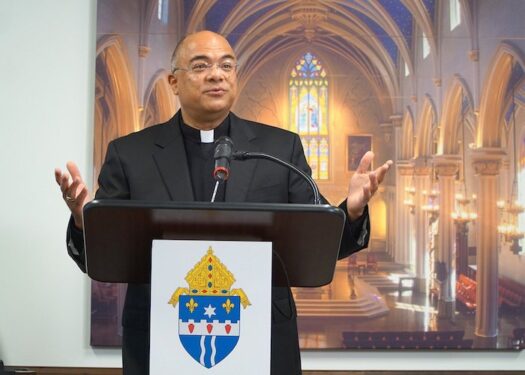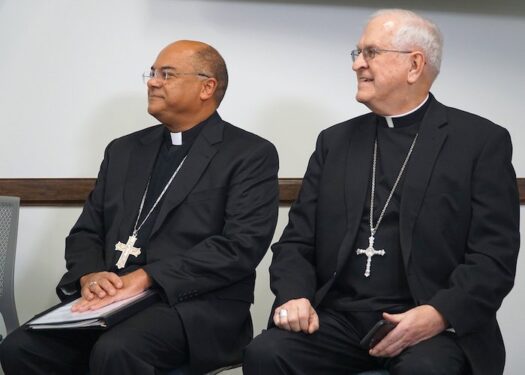
NEW YORK — Standing behind the podium for the first time as Archbishop-elect of Louisville on Jan. 8, Bishop Shelton Fabre recalled his visit to the archdiocese two years ago, when he presented the U.S. bishops’ pastoral letter on racism, “Open Wide Our Hearts,” to local leaders.
Almost two years later, Bishop Fabre, who is the chair of the bishops’ Ad Hoc Committee Against Racism, brought up the visit to give his new flock a “message of joyful hope” about the work towards racial equality in the archdiocese.
“I have great hope that through genuine encounter and accompaniment we will work together to realize an even greater sense of the promotion of life, charity, justice, and peace as we endeavor to build an even greater civilization of love,” Bishop Fabre said. “I look forward to meeting you and experiencing the cultures of this wonderful local church.”
Pope Francis accepted the resignation of Archbishop Joseph Kurtz of Louisville on Jan. 8 and appointed Bishop Fabre, the bishop of Houma-Thibodaux in southeastern Louisiana, as his successor.
Bishop Fabre is the 10th bishop and fifth archbishop in the 214-year history of the Archdiocese of Louisville, which covers 8,124 square miles in Kentucky, and has a population of 1,396,298, of which 1555,998 are Catholic. As the Archbishop of Louisville, Bishop Fabre will be the metropolitan prelate for the province of Louisville, which comprises all the dioceses in both Tennessee and Kentucky.

Bishop Fabre is one of 12 U.S. Catholic Church’s African American prelates, and he will be the first black archbishop of Louisville. At the news conference, he expanded on what he brings to the table with regard to healing from racial injustice.
“A listening heart. A willingness to dialogue,” Bishop Fabre said. “The teachings of the Church and a desire to encounter each and every person and the gift that God has created them to be without regard necessarily for race.”
He said he was “humbled” and “excited” by his appointment during the news conference. To the faithful in the archdiocese, Bishop Fabre said he looks forward “to getting to know you through our interactions and most importantly by listening to your hearts.”
“I also look forward to you getting to know me, as I am here to serve you, to journey with you in faith, and to celebrate all that God is doing in our lives,” Bishop Fabre continued.
The archbishop then greeted the priests, deacons, consecrated religious, and seminarians in the archdiocese, saying that he looks “forward to sharing this mission that has been entrusted to us by Jesus Christ as we work together to serve the needs of the whole people of God.”
After greeting those in his new home, Bishop Fabre got emotional reflecting on his eight-plus years in the Diocese of Houma-Thibodaux and thanking its Catholic population.
“I have been incredibly happy and fulfilled as the Bishop of Houma-Thibodaux,” Bishop Fabre said through tears. “I express gratitude to you for the love, support, kindness you have shown to me during my time with you.”
Bishop Fabre then went into what he is leaving behind, and what he will now embrace.
“I am no longer in the ‘Who Dat Nation’ of New Orleans and the Saints, for I know this is Cardinal and Wildcat country where basketball is king,” he said.
“The Lord has taken me from the bayous to the bluegrass, from gumbo and jambalaya to barbecue and the hot brown,” he continued. “I leave the coats of a Cajun community to walk with you in the foothills of the heartland and I do so knowing that my love for king cake and Mardi Gras will be quenched by mint juleps and the Kentucky Derby.”
Bishop Fabre has led the Diocese of Houma-Thibodaux since 2013. He previously served as an auxiliary bishop of the Archdiocese of New Orleans from 2006 to 2013. Archbishop Kurtz, who Bishop Fabre will replace, was installed as the Archbishop of Louisville in 2007.
Archbishop Kurtz welcomed Bishop Fabre to the archdiocese at the news conference. He noted that they first met at a retreat in Louisville 15 years ago about a month before Bishop Fabre was ordained a bishop.
“We’re getting someone who is a deeply human person,” Archbishop Kurtz said. “A very healthy person. A holy man and in a special way a good pastoral bishop. Boy, are we really blessed.”
